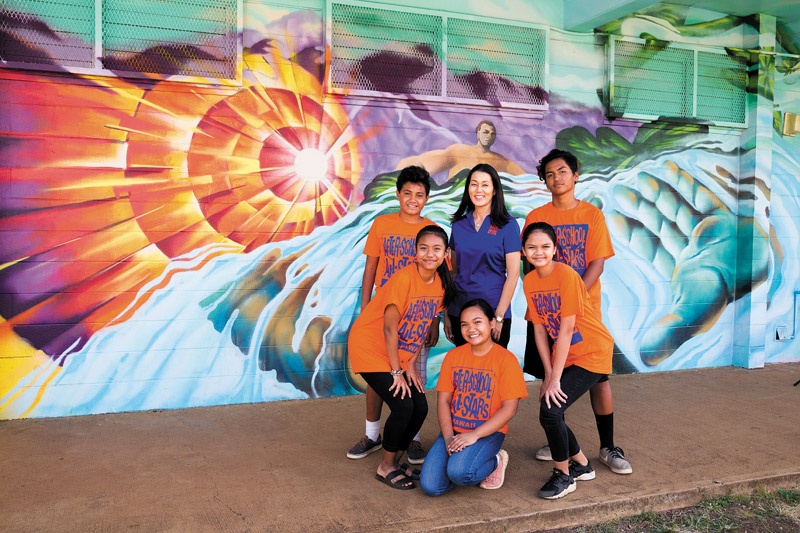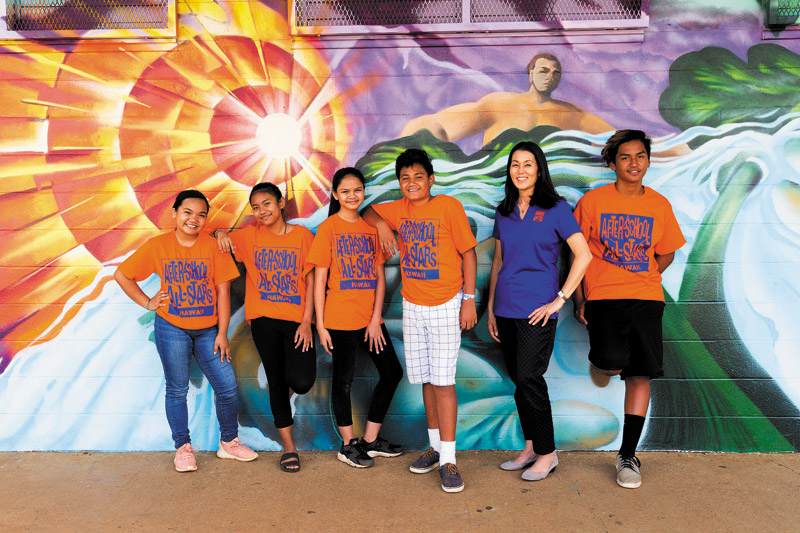Reach For The All-Stars

It’s an all-star gathering for (clockwise from top) After-School All-Stars president-CEO Kimi Takazawa, Haven Kahaleua-Olpendo, Mikayla Mandado, Elizabeth Lacambra, Michaela Estomago and Christian Gafa.
Led by president and CEO Kimi Takazawa, After-School All-Stars Hawai‘i is allowing disadvantaged students to thrive through diverse and developmentally appropriate after-school activities.
It’s 3 o’clock in the afternoon. Do you know where your kids are? The hours of 3 to 6 p.m. on weekdays are critical times for children. Each day in our country, about 8 million kids are left unattended after school is dismissed.
The after-school hours can be dangerous ones for children. The U.S. Department of Justice reports that 29 percent of all juvenile offenses occur on school days between 2 and 8 p.m., and that the number of violent crimes committed doubles in the hour immediately after school is let out.
Students who have a better chance at beating these statistics spend one to four hours per week in extracurricular activities or after-school programs, and are less likely to display behavioral problems.
Teens not engaged in after-school programs are reportedly 49 percent more likely to use drugs and 37 percent more likely to become teen parents.
So much of our tax dollars and community focus is on needs during class time — everything from cooling classrooms to shoring up scholastic achievement. There’s no argument against supporting those endeavors, of course.
EMOTIONAL INTELLIGENCE
But what of the sociological aspects of campus life and the teaching of soft skills needed to succeed in life and the workplace? While teachers shape academic intelligence, who’s molding emotional intelligence? Who provides experiences during those bewitching afternoon and early evening hours, when youngsters are outside the controlled environs of a classroom?

After School All-Stars is in session for Elizabeth Lacambra, Michaela Estomago, Mikayla Mandado, Christian Gafa, ASAS president-CEO Kimi Takazawa and Haven Kahaleua-Olpendo.
We’re glad you asked.
It is a subject close to the mind and heart of Kimi Takazawa, president-CEO of After-School All-Stars Hawai‘i. Get her started on the subject, and the dialogue extends well beyond several cups of coffee and chai tea lattes. Talk about stimulating.
“The definition of an after-school program is a safe environment with structured activities that meets regularly,” she says. “In these programs, teens are supervised, learn new skills and hobbies, and learn to be responsible adults.”
“The genesis of our program is the community,” she says. “A local couple saw a newspaper picture in 2008 of a homeless kid crawling into a tent at the Wai‘anae boat harbor to do his homework. This shocking reality caused them to want to help those less fortunate, and they found others to join the cause.”
STARTED BY THE TERMINATOR
The Hawai‘i chapter is an affiliate of the national After School All-Stars organization, started in 2002 by action star Arnold Schwarzenegger. Currently, ASAS serves almost 92,000 students on over 400 school sites in 14 regions across 10 states.
ASAS Hawai‘i provides free after-school programs for more than 2,000 disadvantaged students on O‘ahu, from Wai‘anae to Pālolo, and on the Big Island from Ka‘ū to Kea‘au.
Programs take place at Title 1 schools, where more than 50 percent of students qualify for the federal free and reduced lunch program, a proxy for poverty.
Jarrett Middle School was the first location, joined later by Central, Kalākaua, King, Nānākuli, Washington, Wai‘anae schools, and Pāhala/Ka‘ū, Kea‘au, and Pāhoa on the Big Island.
“What sets us apart is that we operate in the schools where we build relationships with the administration, students and parents,” Takazawa says. “By running programs at school sites, ASAS does not spend money on construction, maintenance or security of its own buildings.”
“Our fulltime program coordinators are on campus all day and very visible in their bright orange shirts. They are trusted members of the campus network,” she adds.
“You really can’t grow unless you have a safe environment and supportive people around you,” says Takazawa, mother of two sons — Neo, 15, and Jett, 13. Married to local architect Hale Takazawa for 20 years, she is aware of the real-life stages and adjustments adults and teens experience.
That, plus a professional background in nonprofit leadership and marketing communications, has equipped her for directing the unique mission of ASAS that targets middle school students aged 11-14 years.
Why middle school? Glad you asked.
AWKWARD AGE
Washington Middle School principal Michael Harano puts it well: “Middle school is a tough time for kids going through physical and emotional changes, and a lot of kids are trying to find their place. Schools need to have developmentally appropriate activities for them to engage in.”
Harano knows the value of giving teens diverse experiences to ignite their passion.
Washington, for example, is a state MATHCOUNTS champion and a national champion in chess. Students compete in science fairs, botball and LEGO league robotics, spelling bee, video production, art and music competitions. Athletically, the school offers canoe paddling, wrestling, grade 6 track, cross-country, an intramural and extramural program, and Special Olympics.
An alumna of ASAS’s program at Washington is Netty L., who was once a confused and distracted teen.
“With my mother’s passing, I started acting out, hanging out with the wrong friends, did drugs, and almost joined a gang,” she recalls. “My ASAS mentor gave me an ultimatum to either stay or leave. I decided to stay. That’s when my life turned around. I’d definitely be in a gang if I wasn’t in ASAS.”
Today, Netty, 22, is an ASAS program coordinator.
PROMISE OF TOMORROW
As ASAS approaches its 10th year in 2019, students are circling back to the program that helped transform their lives. Many today are volunteers and program coordinators, like Netty.
That is the gratifying part of Takazawa’s role.
“We know our program works,” the ASAS president asserts. “I’ve always been an innovator, looking for ways to make things better. We’ve adopted a Hōkū Pa‘a (North Star) approach to providing high quality programs that allow us to shine brightly, be a permanent force in the universe, and be a wayfinder of destinies.”
Data affirms that ASAS students are less likely to have behavior issues and are more likely to attend school regularly. Student surveys also indicate ASAS helps to improve grades.
ASAS programs focus on academics, enrichment, health and fitness. Within the three hours of after-school time, one hour is devoted to academics (doing homework) and two hours are interactive enrichment activities such as sports, performing arts, career development field trips, and high school prep guidance. A life service action program taps into civic duties.
Depending on locale and socioeconomic factors, career development exposes students to the skills needed for future opportunities. Partnerships with community programs such as Camp Us, University of Hawai‘i, Junior League, and Boy and Girl Scouts further enhance enrichment efforts.
As ASAS founder Schwarzenegger sums it up, “Kids are the most vulnerable citizens. Kids are our future, we need them. When we spend money on kids wisely, we get it back 10 times over.”
Who’s gonna argue with The Terminator?
After-School All-Stars Hawai‘i holds its annual All-Star Affair 5:30 p.m., Friday, Aug. 17 at The Royal Hawaiian. For more information, call 734-1314 or email hiinfo@asashawaii.org.
SPEAK SOFTLY
Are you a master of soft skills? Soft skills relate to attitudes and intuitions. They are less about qualifications and more personality-driven, according to WikiJob.co/uk, a placement consultancy. Here are key soft skills:
COMMUNICATION. Is able to adjust tone and style according to one’s audience. Comprehends and acts efficiently on instructions, and can explain complex issues to others.
SELF-MOTIVATION. Has a positive attitude and initiative to work well without constant supervision.
RESPONSIBILITY. Has self-awareness and knows when to accept responsibility for mistakes. Exhibits humility and is willing to learn to progress.
TEAMWORK. Works toward a common goal with interpersonal acumen and is a good listener. Is perceptive as well as receptive.
NEGOTIATION AND CONFLICT RESOLUTION. Is persuasive and exerts influence while sensitively seeking solutions to benefit all parties. Has good rapport with colleagues.
LEADERSHIP. Possesses a collection of soft skills, including a positive attitude and outlook, ability to communicate effectively, and an aptitude for self-motivating and motivating others.





